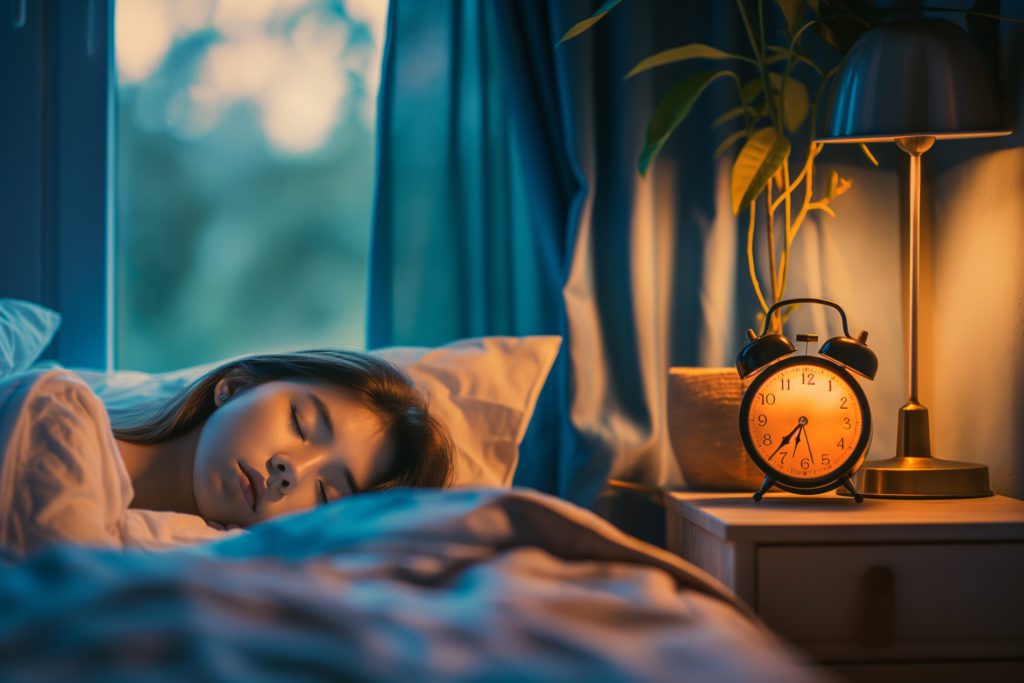
Establishing a Sleep Routine: Tips and Benefits
Getting a sufficient amount of high-quality, restful sleep can be challenging with so many daily stressors and tasks that demand our time and attention.

However, getting adequate sleep is incredibly important for our physical and mental health. One of the primary ways to achieve this is to establish and follow a sleep routine.
Why Are Sleep Routines Important?
Sleep routines help us to physically and mentally wind down at the end of the day. Certain parts of a sleep routine (such as stretching, taking a bath, or doing yoga) can help relax your body and prepare you for comfortable, restful sleep. As a whole, following the same steps of a sleep routine each day will help train your brain to know when it’s time to sleep and help prevent stress or anxiety from keeping you awake.
Tips for Establishing a Sleep Routine
The exact steps in your sleep routine will vary based on your needs and preferences, but here are some tips and guidelines to help you establish an effective routine:
Follow a Consistent Schedule
Consistency is key when it comes to sleep routines, so try to go to sleep and wake up at the same times every day—even on weekends. While it can be tempting to stay awake later and sleep in on weekends, this can disrupt your circadian rhythm and cause you to feel extra tired on Monday mornings.
A consistent schedule helps train your body and brain to feel tired at bedtime and wake easily in the morning. Once you’ve created your bedtime routine and know how long it takes, begin at the same time every evening, giving yourself enough time to complete your routine and be asleep by your target bedtime.
Limit Evening Use of Lights and Electronics
Evening exposure to bright lights—especially blue light—can reduce your body’s production of melatonin, a hormone that helps you fall asleep. If you find that you have trouble falling asleep, try minimizing your exposure to bright lights in the evening hours. This includes your phone, computer, TV, and other devices that produce light, as well as the lighting in your home and bedroom.
Avoid Over- or Under-Eating Before Bed
It’s also important to be mindful of what you eat and drink before bed. Eating a large or heavy meal and/or drinking alcohol before bed can cause stomach discomfort, acid reflux or heartburn, or you may need to get up in the night to use the bathroom. While alcohol can make you feel sleepy at night, it tends to negatively affect the quality of your sleep and can cause sleep disruptions.
Conversely, going to bed with an empty stomach can make it hard to fall asleep or hunger pains can wake you up throughout the night.
Aim to go to sleep neither stuffed nor starving. A light snack a few hours before bed can help you sleep comfortably, but be sure to choose something that won’t adversely affect your sleep—avoid anything that contains caffeine, for example. Some foods such as cherries, oats, and nuts have high melatonin content, which can help you fall and stay asleep.
Create a Relaxing Bedtime Ritual
Depending on how much time you want to spend on your sleep routine and your preferences, there are many different activities to choose from to create a calming evening routine. Here are some examples:
Take a warm bath or soak in a hot tub
When your body is preparing for sleep, your melatonin production rises and your core body temperature drops. You can artificially trigger this drop in body temperature by soaking in warm water, after which your core temperature will drop quickly when you exit the water. This generally makes you feel relaxed, sleepy, and ready for bedtime.
Listen to music or other relaxing audio
Listening to music can help take your mind off of any stressors or distractions, fall asleep more easily, and stay asleep. Any genre of music that you find relaxing can help, or you can check out bedtime or sleep-related playlists on Spotify or other music streaming platforms. If music is too much for you, try listening to white noise or pink noise—these sounds include things like gentle static, fan noise, ocean waves, a babbling brook, rain, and so forth.
Do yoga, stretch, practice breathwork, or meditate
These types of activities can help ease tension and relieve insomnia. Relaxing your body as well as your mind before you get into bed often makes a significant difference in terms of your ability to fall asleep quickly and stay asleep through the night.
Read a book
Reading a book is a common part of bedtime routines for children, but it can be just as effective for adults. Avoid high-octane books that might rev up your mind before you attempt to go to sleep—reach instead for the beach reads or biographies.
Journal or make a to-do list
Worrying about upcoming tasks is one of the most common causes of the inability to fall asleep. Fortunately, writing a quick but detailed list of things that you need to accomplish in the next few days can help you relax, knowing that your to-dos are safely written down and won’t be forgotten. Journaling about things you’ve already completed or your thoughts and feelings can also be helpful as a way to wind down.
Again, you don’t need to do all of these activities as part of your sleep routine, or you may find that different activities altogether are more effective for you. These are simply suggestions that are designed to serve as a starting point for creating your own personalized sleep routine.
Optimize Your Sleeping Space
Finally, ensure that your sleeping space is conducive for restful sleep. Keep your bedroom free of clutter and air out the room regularly to avoid stuffiness. Use blinds or blackout curtains to keep the space dark and block out any distracting lights. Cool temperatures make it easier to sleep, so turn your thermostat down overnight in the winter and use air conditioning or fans to keep your bedroom cool on summer nights. 60-70 degrees Fahrenheit is optimal for most people.
Turn off any noisy electronics or other noise-making devices before you go to sleep. If you have noisy neighbors or otherwise can’t control the noise level, opt for sleep headphones, earplugs, or a white noise machine to help block out distracting sounds.
Last, make sure that your bed is comfortable and inviting. Choose an appropriate mattress based on your height, weight, and preferred sleeping position. Invest in quality bedding if you can, and wash your sheets regularly so they feel crisp and cozy.
References
- Institute for Quality and Efficiency in Health Care - Insomnia: Relaxation techniques and sleeping habits
https://www.ncbi.nlm.nih.gov/books/NBK279320/ - Luc Staner - Sleep and anxiety disorders
https://pubmed.ncbi.nlm.nih.gov/22033804/ - Circadian Rhythms
https://www.nigms.nih.gov/education/fact-sheets/Pages/circadian-rhythms.aspx - Melatonin: What You Need To Know
https://www.nccih.nih.gov/health/melatonin-what-you-need-to-know - Cibele Aparecida Crispim, Ioná Zalcman Zimberg, Bruno Gomes dos Reis, Rafael Marques Diniz, Sérgio Tufik, Marco Túlio de Mello - Relationship between food intake and sleep pattern in healthy individuals
https://pubmed.ncbi.nlm.nih.gov/22171206/ - J A Spencer, D J Moran, A Lee, D Talbert - White noise and sleep induction
https://pubmed.ncbi.nlm.nih.gov/2405784/ - Can Pink Noise Help You Sleep?
https://health.clevelandclinic.org/why-pink-noise-might-just-help-you-get-a-better-nights-sleep/ - Michael K Scullin, Madison L Krueger, Hannah K Ballard, Natalya Pruett, Donald L Bliwise - The effects of bedtime writing on difficulty falling asleep: A polysomnographic study comparing to-do lists and completed activity lists
https://pubmed.ncbi.nlm.nih.gov/29058942/ - Danielle Pacheco, Heather Wright - Bedtime Routines For Adults
https://www.sleepfoundation.org/sleep-hygiene/bedtime-routine-for-adults
FAQ
Are power naps a good or bad addition to a sleep routine?
Short naps (15-30 minutes) can boost energy without disrupting your nighttime sleep. However, napping too late in the day or for too long can interfere with your regular sleep schedule.
Can setting a consistent "bedtime alarm" help reinforce a sleep routine?
Just as a morning alarm helps you wake up, a bedtime alarm can remind you to start winding down and maintain consistency in your sleep schedule.
What are some effective ways to reset your sleep routine after a period of irregular sleep?
Gradually shifting your bedtime and wake-up time in 15-minute increments and exposing yourself to natural light in the morning can help reset your rhythm.
How can you stay motivated to stick to a sleep routine during stressful periods?
Using tools like habit trackers, reminders, or pairing your routine with calming self-care activities can help maintain consistency, even when life gets hectic.
Can incorporating nature sounds into your bedtime routine improve sleep?
Listening to soothing sounds like rain, ocean waves, or forest ambience can help calm the mind and create a serene atmosphere for sleep.

Written by
Cat Caroll
Articulate Writer and Analytical Editor
Download Pillow
Get help
Press & News
Legal
Connect
X (Twitter)
Company
Copyright © Neybox Digital Ltd.



